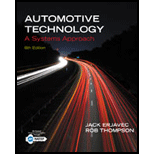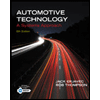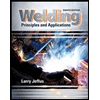
Automotive Technology: A Systems Approach (MindTap Course List)
6th Edition
ISBN: 9781133612315
Author: Jack Erjavec, Rob Thompson
Publisher: Cengage Learning
expand_more
expand_more
format_list_bulleted
Textbook Question
Chapter 55, Problem 9RQ
All of the following are true statements about flushing an A/C system after a compressor failure, except
- The condenser must be flushed and the receiver/ dryer replaced.
- Filter screens are sometimes located in the suction side of the compressor and in the receiver/dryer. These screens confine foreign material to the compressor, condenser, receiver/dryer, and connecting hoses.
- Use only CFCs for flushing. After the system has been flushed, be sure to oil all components that require it.
- Some manufacturers recommend replacing the clogged components and installing a liquid line (inline) filter just ahead of the expansion valve or orifice tube instead of flushing the system.
Expert Solution & Answer
Trending nowThis is a popular solution!

Students have asked these similar questions
I need expert handwritten solutions to this question, don't use Ai
please help solve us Pcr=pi^2EI/KL^2 formula and SF formula
please help, i am not sure what i am doing wrong
Chapter 55 Solutions
Automotive Technology: A Systems Approach (MindTap Course List)
Ch. 55 - What should you do if you suspect that an...Ch. 55 - Explain how dye can be used to find leaks in the...Ch. 55 - What is the purpose of the thermostatic switch in...Ch. 55 - Why should the probe of an electronic leak...Ch. 55 - How will air trapped in the A7C system affect...Ch. 55 - Which of the following statements best defines the...Ch. 55 - Which of the following statements is not true...Ch. 55 - To charge an air-conditioning system while it is...Ch. 55 - All of the following are true statements about...Ch. 55 - A very important part of a performance test on an...
Ch. 55 - While conducting a pressure test on an A/C system,...Ch. 55 - The high-side pressure on a system with a cycling...Ch. 55 - When checking an A/C system, the evaporators inlet...Ch. 55 - All of these are good reasons for replacing an...Ch. 55 - In an AZC system, if the low-side pressure is...Ch. 55 - Technician A says that evacuating (pumping down)...Ch. 55 - Technician A says that some refrigerant leaks can...Ch. 55 - Technician A says that the presence of oil around...Ch. 55 - Technician A says that a faulty accumulator will...Ch. 55 - Technician A says that air in the system can cause...Ch. 55 - Technician A feels up and down the face or along...Ch. 55 - Technician A says that a manifold gauge set can be...Ch. 55 - While discussing an inoperative blend air door:...Ch. 55 - Two technicians were discussing how comparing the...Ch. 55 - While conducting an A/C system performance test:...
Knowledge Booster
Learn more about
Need a deep-dive on the concept behind this application? Look no further. Learn more about this topic, mechanical-engineering and related others by exploring similar questions and additional content below.Similar questions
- Consider the combined gas-steam power cycle. The topping cycle is a gas-turbine cycle that has a pressure ratio of 8. Air enters the compressor at 300 K and the turbine at 1300 K. The isentropic efficiency of the compressor is 80%, and that of the gas turbine is 85%. The bottoming cycle is a simple Rankine cycle operating between the pressure limits of 7 MPa and 5 kPa. Steam is heated in a heat exchanger by the exhaust gases to a temperature of 500°C and the isentropic efficiency of the turbine is 90 %. The exhaust gases leave the heat exchanger at 450 K. Considering the mass flow rate steam as 1 kg/s, determine: A) Net power, B) Total input heat, C) Total entropy generation, D) Energy efficiency, E) Exergy efficiency, F) T-s diagram Solve by EES Compressor Air -③ in Exhaust gases Pump Combustion chamber Gas turbine Gas cycle Heat exchanger Condenser Steam Steam turbine cyclearrow_forwardI need expert solution s to this question, don't use Artificial intelligencearrow_forwardI need solutions to this questions Don't use Artificial intelligencearrow_forward
- Please consider the following closed-loop Multiple-Input Multiple-Output (MIMO) control system: R₁(s) and R2(s) are the reference signals (or inputs), • G₁(s) (where i = 1,2,3,4,5) are the plant transfer functions, • C₁(s) and C2(s) are the responses (or system outputs), • All of them are in Laplace domain. R2 + R₁ + + G₂(s) G3(S) Tasks: G5(s) G4(s) + G₁(s) می a) Please derive the transfer function between C₁ (s) and R₂(s) (i.e., find R₂(s) (10 marks) (10 marks) b) Please derive the transfer function between C₂(s) and R₁(s) (i.e., find C2 (s)). R₁(s) Hint: Please carefully analyse how the signals interact with the plants G₁(s) and find all paths fromarrow_forwardMột thanh dài L = 2,5 m được nối bằng chốt với một con lăn ở A. Con lăn chuyển động dọc theo một đường ray nằm ngang như hình vẽ với VA 5 m/s. Xác định vận tốc của điểm C (trung điểm của thanh AB) = tại thời điểm 0 = 33° và O = 0.4 rad/s. A. v = (-5.42+0.272})(m/s) C. v = (5.421+0.272})(m/s) B. v =(0.272i+5.42j)(ms) D. (5.42-0.272)(m/s) = C Barrow_forwardThe simulink and Matlab part are the prioritized areas please.arrow_forward
- Please do not rely too much on chatgpt, because its answer may be wrong. Please consider it carefully and give your own answer. You can borrow ideas from gpt, but please do not believe its answer.Very very grateful! Please do not copy other's work,i will be very very grateful!!arrow_forwardAn industrial burner uses natural gas as fuel. The natural gas consists primarily of CH4 with small quantities of several other light hydrocarbons and can be represented as C1.16H4.32 To achieve low emissions of oxides of nitrogen, the burner operates lean at equivalence ratio of 0.4. Assume complete combustion and answer the following questions. i) What is the operating air-fuel ratio (i.e. mass air/mass of fuel)? [6 marks] ii) What is the percent excess air in the combustion products? [3 marks] iii) What is the oxygen (O2) mole fraction in the combustion products? [6 marks]arrow_forward1) Consider the robot, with six degrees of freedom, RRPRR, shown in the following figure.Place the axes through the denavit-hartenberg algorithm and obtain the respective parameter table for the first three joints. 2) Considering the robot from question 1, calculate.the. Determine the Homogeneous Transformation Matrix in relation to the Direct Kinematics of the robot, for the first three joints:b. Considering the first three joints of the robot and L1 and L2 equal to 200 mm:I. calculate the pose of the robot relative to the base, knowing the joint variableshave the following values: q1= 90°, q2= 0°, q3= 50mm:arrow_forward
arrow_back_ios
SEE MORE QUESTIONS
arrow_forward_ios
Recommended textbooks for you
 Automotive Technology: A Systems Approach (MindTa...Mechanical EngineeringISBN:9781133612315Author:Jack Erjavec, Rob ThompsonPublisher:Cengage Learning
Automotive Technology: A Systems Approach (MindTa...Mechanical EngineeringISBN:9781133612315Author:Jack Erjavec, Rob ThompsonPublisher:Cengage Learning Refrigeration and Air Conditioning Technology (Mi...Mechanical EngineeringISBN:9781305578296Author:John Tomczyk, Eugene Silberstein, Bill Whitman, Bill JohnsonPublisher:Cengage Learning
Refrigeration and Air Conditioning Technology (Mi...Mechanical EngineeringISBN:9781305578296Author:John Tomczyk, Eugene Silberstein, Bill Whitman, Bill JohnsonPublisher:Cengage Learning Welding: Principles and Applications (MindTap Cou...Mechanical EngineeringISBN:9781305494695Author:Larry JeffusPublisher:Cengage Learning
Welding: Principles and Applications (MindTap Cou...Mechanical EngineeringISBN:9781305494695Author:Larry JeffusPublisher:Cengage Learning

Automotive Technology: A Systems Approach (MindTa...
Mechanical Engineering
ISBN:9781133612315
Author:Jack Erjavec, Rob Thompson
Publisher:Cengage Learning

Refrigeration and Air Conditioning Technology (Mi...
Mechanical Engineering
ISBN:9781305578296
Author:John Tomczyk, Eugene Silberstein, Bill Whitman, Bill Johnson
Publisher:Cengage Learning

Welding: Principles and Applications (MindTap Cou...
Mechanical Engineering
ISBN:9781305494695
Author:Larry Jeffus
Publisher:Cengage Learning
The Refrigeration Cycle Explained - The Four Major Components; Author: HVAC Know It All;https://www.youtube.com/watch?v=zfciSvOZDUY;License: Standard YouTube License, CC-BY